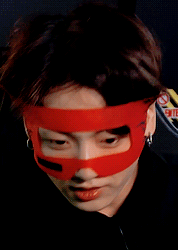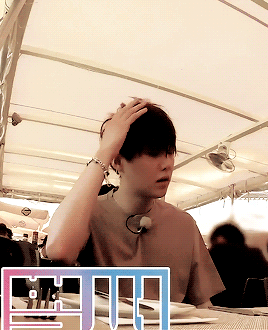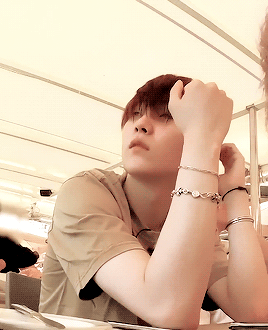Text
Phrases: Ordering Food and Shopping
Sorry for a short list;; I was rushing it ;-; message me for requests!
How much is this?- (이거) 얼마에요?
I’ll pay with card- 카드로 결제 할께요
I’ll pay with cash- 현금으로 결제 할께요
Can I have the receipt?- 영수증 주세요?
Can I have ___ and ___?- ___랑 ___ 주세요?
Is there a (shop/restaurant name) nearby?- 주변에 ___있어요?
Can I have a burger and a Coke?- 버거랑 콜라 주세요
How much is it with the discount?- 할인해서 얼마에요?
Can I have a discount?- 조금만 깎아 주세요
Does this taste good?- 이거 맛있어요?
Can you recommend a menu for me?- 메뉴에서 추천해주세요
Can I have one of (drink name)?- (drink name) 한병만 주세요
Can I have it takeaway?- 이거 포장 해주세요
Can I have it delivered?- 배달해주세요
296 notes
·
View notes
Text
Phrases: Ordering Food and Shopping
Sorry for a short list;; I was rushing it ;-; message me for requests!
How much is this?- (이거) 얼마에요?
I’ll pay with card- 카드로 결제 할께요
I’ll pay with cash- 현금으로 결제 할께요
Can I have the receipt?- 영수증 주세요?
Can I have ___ and ___?- ___랑 ___ 주세요?
Is there a (shop/restaurant name) nearby?- 주변에 ___있어요?
Can I have a burger and a Coke?- 버거랑 콜라 주세요
How much is it with the discount?- 할인해서 얼마에요?
Can I have a discount?- 조금만 깎아 주세요
Does this taste good?- 이거 맛있어요?
Can you recommend a menu for me?- 메뉴에서 추천해주세요
Can I have one of (drink name)?- (drink name) 한병만 주세요
Can I have it takeaway?- 이거 포장 해주세요
Can I have it delivered?- 배달해주세요
296 notes
·
View notes
Text
Vocab List- Weather/Weather Conditions & Weather Phrases
Flashcards

These are just some and not all so please keep that in mind as you read this. I may have missed a few weather conditions and I apologize if i have.
Weather Conditions
Rain- 비 (bi)
Snow- 눈 (noon)
Lightning- 번개 (bun-gae)
Flood- 홍수 (hongsoo)
Cloud- 구름 (goo-reum)
Thunderstorm- 폭풍우 (pok-poong-woo)
Ice- 얼음 (u-reum)
Hail- 우박 (woobak)
Fog- 안개 (an-gae)
Rainbow- 무지개 (moojigae)
Weather Phrases
The weather is cloudy- 날씨가 흐려요 (Naltsi-ga heu-ryu-yo)
The weather is cold- 날씨가 추워요 (Naltsi-ga choo-wu-yo)
The weather is fine- 날씨가 맑아요 (Naltsi-ga mal-ga-yo)
The weather is hot- 날씨가 더워요 (Naltsi-ga du-wu-yo)
The weather is humid- 날씨가 습해요 (seup-hae-yo)
The weather is warm- 날씨가 따듯해요 (tda-tdeut-hae-yo)
It is windy- 바람 불어요 (ba-ram boo-ru-yo)
Add 너무 (nu-moo) or 많이 (ma-ni) for the above phrases to emphasize the weather condition.
너무 추워요.Numoo choowuyoIt’s very cold.
너무 따듯해요.Numoo tdatdeut haeyoIt’s very warm.
너무 더워요.Numoo duwuyoIt’s very hot.
너무 많이 바람 불어요.Numoo baram booruyoIt’s very windy.
176 notes
·
View notes
Text
Turning Nouns into Adjectives Pt.1
All sentences must end with either a verb or adjective
All verbs/adjectives end with the syllable ‘다’
All sentences must end with either a verb or adjective Yes, but verbs and adjectives can ALSO go elsewhere in a sentence. In the previous lesson, you learned this sentence:
나는 배를 원하다 = I want a boat 나는 배를 원해 / 저는 배를 원해요
But what if you want to say: “I want a big boat.” In that sentence, there is a verb and an adjective. The adjective is placed in the same place as English! For example:
나는 배를 원하다 = I want a boat 나는 big 배를 원하다 = I want a big boat
Simple! So do we just substitute the Korean word for big (크다) into that sentence?:
나는 크다 배를 원하다 = Incorrect. Makes no sense.
Here’s the second rule:
All verbs/adjectives end with the syllable ‘다’ – Yes, but the version of the word with ‘다’ as the last syllable is simply the dictionary form of that word and is rarely used. Every verb/adjective in Korean has a ‘stem,’ which is made up of everything preceding 다 in the dictionary form of the word. Let’s look at some examples:
크다 = 크 (stem) + 다 ➡️ 큰 작다 = 작 (stem) + 다 ➡️ 작은 좋다 = 좋 (stem) + 다 ➡️ 좋은 길다 = 길 (stem) + 다 ➡️ 긴 배우다 = 배우 (stem) + 다 ➡️ 배운
Most of the time, when you deal with a verb/adjective, you eliminate ~다 and add something to the stem. When you want to make an adjective that can describe a noun, as in:
small boy big boat delicious hamburger soft hand
you must eliminate ‘~다’ and add ~ㄴ or ~은 to the stem of the adjective.
Words in which the last syllable of the stem ends in a vowel (크다/비싸다/싸다) you add ~ㄴ to the last syllable:
WordStemAdjective that can describe a nounExampleTranslation
크다➡️큰➡️큰 배Big boat
비싸다➡️비싸➡️비싼➡️비싼 음식Expensive food
싸다➡️싸➡️싼➡️싼 것Cheap thing
Keep reading
205 notes
·
View notes
Text
50 Sets of Opposites
빠르다 to be fast / 느리다 to be slow
작다 to be small / 크다 to be big
짧다 to be short / 길다 to be long
키가 작다 to be short (height) / 키가 크다 to be tall
날씬하다 to be slim / 뚱뚱하다 to be fat
멍청하다 to be dumb / 똑똑하다 to be smart
좁다 to be narrow / 넓다 to be wide
어둡다 to be dark / 밝다 to be bright
화창하다 to be sunny / 흐리다 to be cloudy
춥다 to be cold / 덥다 to be hot
잘생기다 to be handsome / 못생기다 to be ugly
일찍 (or 빠르다 depending on context) early / 늦다 to be late
시끄럽다 to be noisy / 조용하다 to be quiet
좋다 to be good / 나쁘다 to be bad
안전하다 to be safe / 위험하다 to be dangerous
더 more / 덜 less
자다 to sleep / 깨다 to wake up
고치다 to fix or repair / 고장하다 to be broken (down)
행복하다 to be happy / 슬프다 to be sad
배고프다 to be hungry / 배부르다 to be full
건강하다 to be healthy / 아프다 to be sick
합격하다 to pass / 실패하다 to fail
잡다 To catch / 떨어지다 to drop
끼다 to be tight (like clothes) / 헐렁하다 to be loose
가볍다 to be light / 무겁다 to be heavy
약하다 to be weak / 강하다 to be strong
결혼하다 to be married / 이혼하다 to be divorced
살다 to live / 죽다 to die
웃다 to laugh / 울다 to cry
앉다 to sit / 서다 to stand
깨끗하다 to be clean / 더럽다 to be dirty
가만히 있다 to stay still / 움직이가 to move
걷다 to walk / 달리다 to run
낮다 to be low / 높다 to be high
부드럽다 to be soft / 딱딱하다 to be firm
열다 to open / 닫다 to close
켜다 to turn on / 끄다 to turn off
입다 to wear / 벗다 to take off
전화하다 to call / 끊다 to hang up
무디다 to be dull or blunt / 뾰족하다 to be pointed (or 날카롭다 to be sharp)
부주의하다 to be careless / 조심하다 to be careful
비어있다 to be empty / 가득하다 to be full
젊다 to be young / 늙다 to be old
기민하다 to be alert / 졸리다 to be sleepy
찬성하다 to support / 반대하다 to oppose
달다 to be sweet / 짜다 to be salty
불투명하다 opaque / 투명하다 to be transparent
쓰다 to write / 지우다 to erase
깁다 to sew or mend / 자르다 to cut
자유 freedom / 투옥 imprisonment
2K notes
·
View notes
Text
Personal Information Vocab
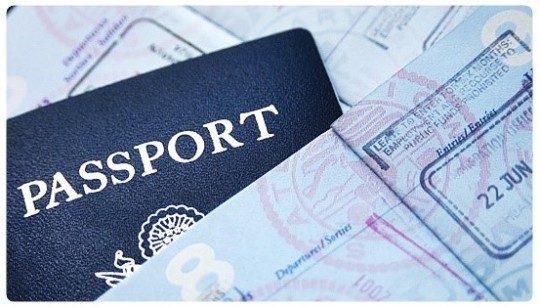
If you’re planning on going to Korea for school or work. You will absolutely have to fill out Visa paperwork. This is the first section of all Visa paperwork, but are also common words you will see on other official documentation.
어휘 Vocabulary:
인적사항 | personal details
여권에 기재된 영문 성명 | full name as shown on passport in English
여권 | passport
기재된 | written/entered
영문 | English (written)
성명 | (full) name
성 | family name (last name)
명 | given name (first and middle names)
한자성명 | Chinese characters for your name (only relevant to people that have them)
성별 | gender
남성 | male
여성 | female
생년월일 | date of birth
국적 | nationality
출생국가 | country of birth
국가신분증번호 | national identity number (to my knowledge, its the equivalent of a social security number)
질문 Questions:
이전에 한국에 출입국하였을 때 다른 성명을 사용했는지 여부 | Have you ever used any other names to enter or depart from Korea?
이전(에) | previous(ly)
한국 | Korea
출입국 | enter and exit
다른 | different/another
사용 | use
여부 | basically means “whether or not”
복수 국적 여부 | Do you have multiple citizenships/nationalities?
복수 | plural/multiple
대답 Answers:
아니오 | no
예 | yes
‘예’ 선택 시 상세내용 기재 | if “yes” please write details
선택 | choice/choose
시 | when
상세내용 | details of circumstance (i.e. other names used or names of countries where you have dual citizenship)
1K notes
·
View notes
Text
Ordering at a Cafe in Korean
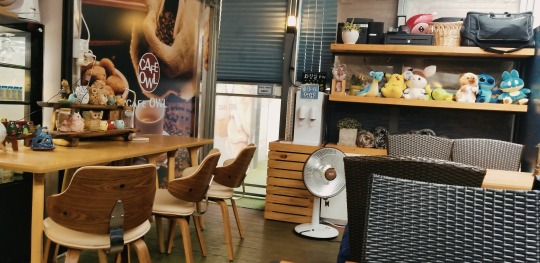

I’m going to go through the average conversation I have at a cafe here in Korea. Refer to Cafe Drink Vocabulary to say more specific drinks~
BARISTA: 어서오세요/안녕하세요 | Welcome/Hello
CUSTOMER: 네 안녕하세요 | Hello
BARISTA: 주문하시겠어요? | Are you ready to order?
CUSTOMER: ___ 한잔 주세요 | I’ll have a ___.
커피 | coffee
아메리카노 | americano
카페라떼 | cafe latte
두잔 | 2 cups/glasses
세잔 | 3 cups
네잔 | 4 cups (keep going like that with Native Korean numbers. After 4, you do not shorten the number)
BARISTA: 어떤 사이즈로 드릴까요? | What size?
CUSTOMER: ___ 주세요. | A ___, please.
스몰 | small
미디엄 | medium
레귤러 | regular
라지 | large
BARISTA: 더 필요하신거 있어요? | Do you need anything else?
CUSTOMER:
아니요. 그거면 되요. | No that’s all.
네. 초코케이크도 하나 주세요. | Yes. Please give me a slice of cake as well.
네. 아이스바닐라라떼 한잔 하고 딸기 마카롱 두개 주세요 | Yes. Please give me an iced vanilla latte and 2 strawberry macarons.
BARISTA: 여기서 드실거예요? | Are you eating here?
CUSTOMER:
네 여기서 마실거예요. | Yes, I’ll drink it here.
아니요. 가져갈거예요. | No I’m taking it out.
아니요. 포장해주세요. | No, please wrap it up (to-go, usually for food or food/drink).
아니요. 테이크아웃이에요. | No, it’s take-out.
BARISTA: 오천 사백원입니다. | It’s 5,400 won. (Use Sino Korean numbers with money)
CUSTOMER: 카드 받으세요? | Do you take card?
BARISTA:
네 받습니다 | yes
죄송합니다 현금만 받습니다 | Sorry we only take cash
BARISTA: 영수증 드릴까요? | Would you like the receipt?
CUSTOMER:
네 영수증 주세요 | yes please give me the receipt
아니요 괜찮아요 | no I’m okay
BARISTA: 감사합니다. 잠시만 기다려주세요. | Thank you. Please wait a moment.
CUSTOMER: 감사합니다 | thank you.
Practice:
Try to place an order for one of the pictures below
1) Sangria Ade, 2) Iced americano and a scone, 3) Tiramisu cake (I think) and a latte, or 4) Affogato
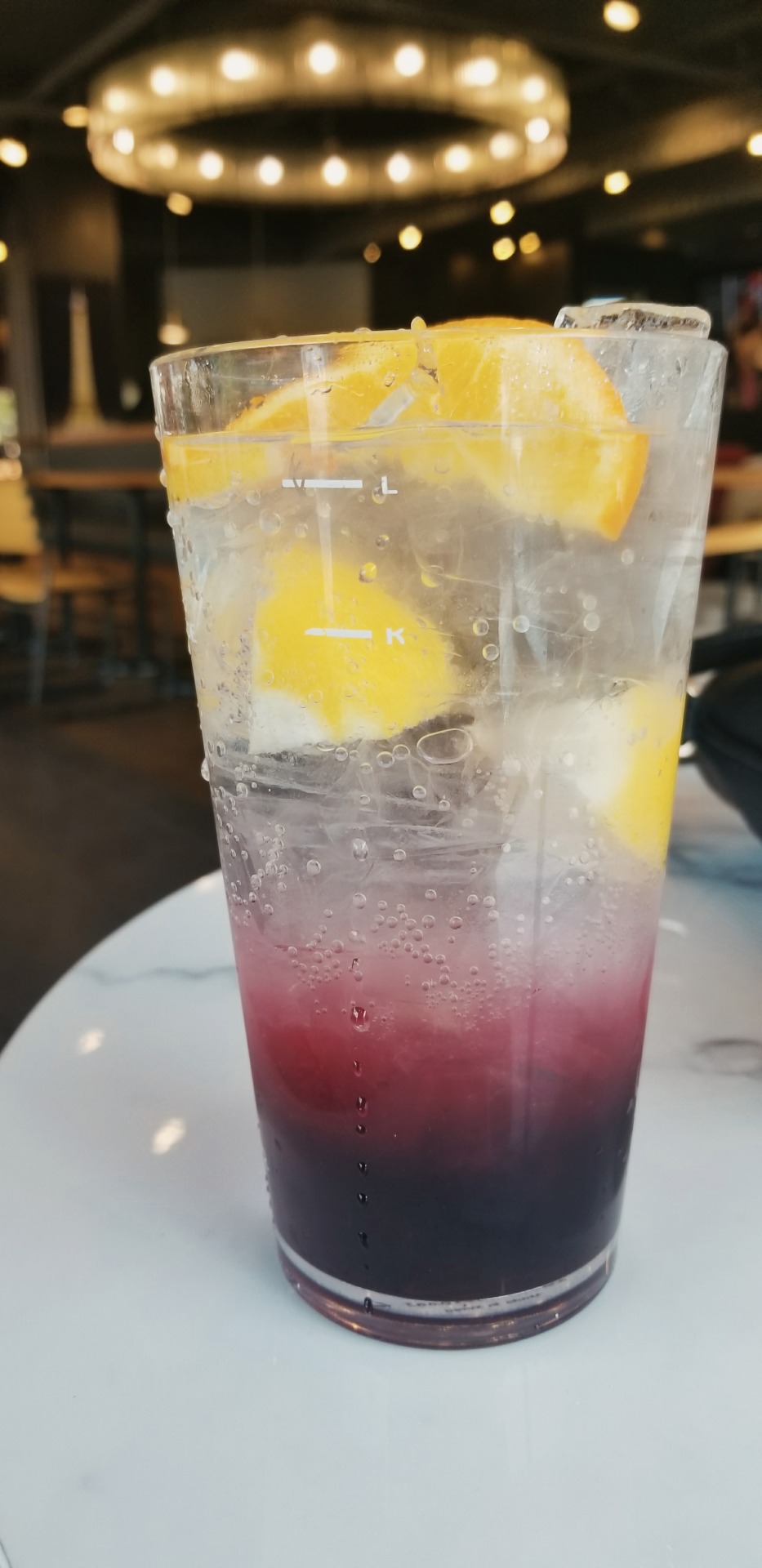
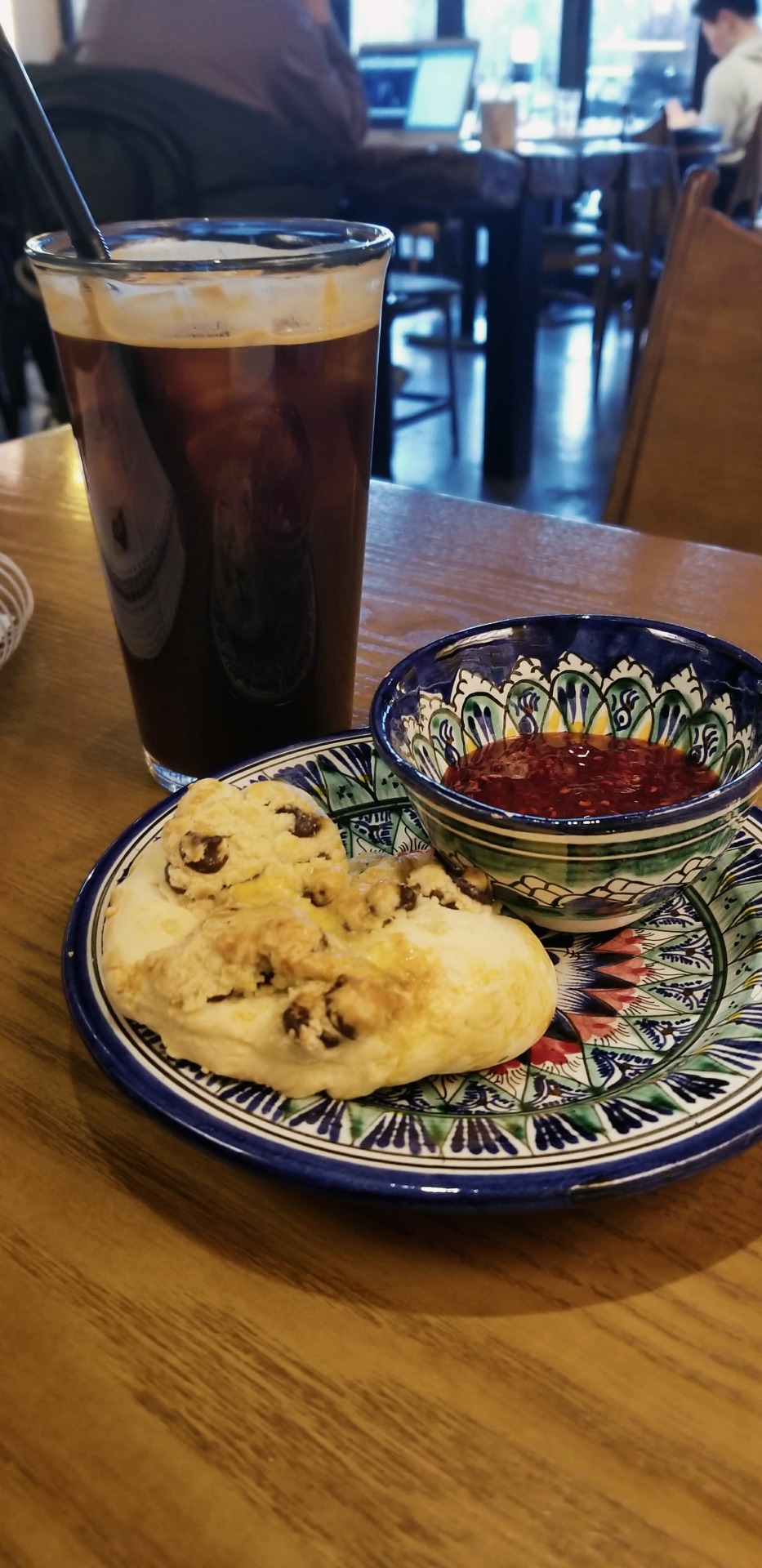

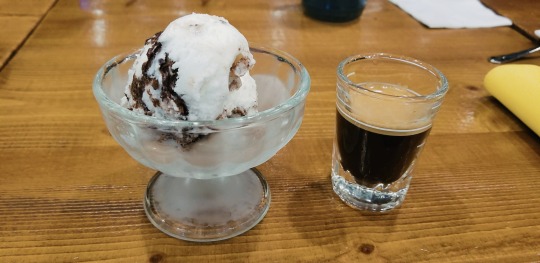
1K notes
·
View notes
Text
Grammar
Lesson Eighteen: And / With

Masterlist
Previous Lesson
안녕하세요 여러분! Last time we talked about how to say ‘and’ and ‘therefore’, this time we will discuss another way to say ‘and’ as well as ‘with’.
시작합시다

And
You can use 하고 and (이)랑 to express the word ‘and’.
-
하고
하고 is used like a particle and attached after a noun with a space.
Example
- 그녀 = Her
- 그녀하고 그녀 = Her and her
-
(이)랑
If a noun ends in a vowel, you use 랑.
If a noun ends in a consanant, you use 이랑.
Examples
우유 = Milk
주스 = Juice
우유랑 주스 = Milk and juice
-
빵 = Bread
물 = Water
빵이랑 물 = Bread and water
-
(이)랑 and 하고 are interchangeable. However, (이)랑 is more casual so you’d probably use 하고 in formal situations.

With
(이)랑 and 하고 usually mean ‘and’. However, they can also hold the meaning of ‘with’ depending on the context.
Examples
친구하고 영화 봤어요. = I saw a movie with a friend.
친구이랑 영화 봤어요. = I saw a movie with a friend.
It is very unlikely that someone would say, “I watched a friend and a movie,” so it’s safe to assume (이)랑 and 하고 mean ‘with’ in situations like this.
If you want to make yourself crystal clear, you can add ‘같이’ after (이)랑 or 하고 to say “together with”.

Sample Sentences
-
“지갑에 학생증이랑 신용카드가 들어 있거든.”
My student I.D. and credit cards are in my wallet.

-
“더 이상 그 사람하고 같이 일 못 하겠어!”
I can’t stand working with him anymore!

-
“전화번호랑 성함을 말씀해 주시겠어요?”
Can I have your name and phone number, please?


166 notes
·
View notes
Text
Sample Conversations
Lesson Eighteen: “Were You Absent Again Today?”

Masterlist
Previous Lesson
——————————————————————————
Conversation
(영어)
-
SO-MIN
Were you absent again today?
-
JOONG-GI
Yeah, I’m not able to get up in the morning at all. Even now, I’m not fully awake.
-
SO-MIN
Because you sleep so late all the time, you can’t get up in the morning. Why did you sleep late yesterday?
-
JOONG-GI
It’s because the drama was fun so I watched it from beginning to end all at once.

Conversation
(한국어)
-
소민
오늘도 결석했어?
-
중기
응, 요새 아침에 도저히 못 일어나겠어. 지금도 잠이 안 깨.
-
소민
맨날 늦게 자나까 아침에 못 일어나지. 어제는 왜 늦게 잤어?
-
중기
드라마가 재미있어서 처음부터 끝까지 한꺼번에 몰아서 봤거든.

Breakdown
-
오늘 = Today
-도 = Too, Also, Even
결석 = Absence
-
응 = Yes [반말]
요새 = These days, Lately
아침 = Morning
-에 = [Time marking particle]
도저히 = Absolutely, Utterly
못 = Not, Can’t
일어나다 = To get up
지금 = Now
-도 = Too, Also, Even
자다 = To sleep
-이 / 가 = [Subject marking particle]
-
맨날 = Daily, Every day
늦다 = To be late
자다 = To sleep
아침 = Morning
-에 = [Time marking particle]
못 = Not, Can’t
일어나다 = To get up
어제 = Yesterday
-은 / 는 = [Topic marking particle]
왜 = Why
-
드라마 = Drama
-이 / 가 = [Subject marking particle]
재미있다 = To be fun, To be interesting
처음 = Beginning, Start
-부터 = From…
끝 = End, Finish
-까지 = To…
한꺼번에 = (All) At once
몰다 = To drive
보다 = To see, To watch


155 notes
·
View notes
Text
📚Study session vocab
📐Subjects
Maths- 수학
Science- 과학
Biology- 생물학
Chemistry- 화학
Earth sciences- 지구과학
Physics- 물리학
Language- 언어
English- 영어
Art- 미술
Music- 음악
History- 역사
Society and culture- 사회•문화
📝Things you need
Laptop- 노트북
iPad- 아이패드
Notebook- 노트
Pen- 펜
Highlighter- 형광펜
Stopwatch- 스톱워치
🏠Places to study
Library- 도서관
Home- 집
Study room-독서실
Cafe-카페
279 notes
·
View notes
Photo









Small part of my favourite Yoongi looks for @springsn0w ♡
9K notes
·
View notes
















